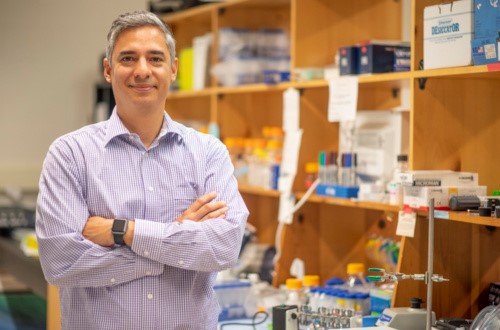About
Hugo Sanabria, an Associate Professor of Biophysics, joined the Department of Physics and Astronomy at Clemson University in 2014. He earned his B.S. (1999) in physics engineering at Tecnológico de Monterrey in Mexico. He then obtained his M.S. and Ph.D. in physics at the University of Houston in 2002 and 2005. During this time, he studied the dielectric response of polyelectrolyte solutions, including biopolymers. After his studies, Sanabria was awarded an NIH training grant in nanobiology for his postdoctoral training at the University of Texas Health Science Center at Houston, where he used single-molecule methods for studying Ca2+ signaling in live cells and neurons.
Subsequently, he was awarded an Alexander von Humboldt postdoctoral research award under the supervision of Prof. Seidel at Heinrich Heine University in Düsseldorf, Germany. His research interest focuses on understanding the connection between structure, dynamics, and function of synaptic signaling molecules and protein responsible for neurological and neurodevelopmental disorders. In 2014 he joined Clemson University and, in 2016, he was
named C.U. School of Health Research Faculty Scholar. He is a recipient of the prestigious NSF CAREER award, the 2019 Board of Trustees Excellence award, and the 2019 HORIBA Young Fluorescence Investigator Award. NSF and NIH fund his research program.
Visit Dr. Sanabria's Faculty Profile.
How their research is transforming health care
Sanabria's scholarship and research at the molecular level give insight into the mechanism of biomolecular interactions and regulation of biomolecules. His research will help alleviate the excruciating cost of treating and preventing neurological and neurodevelopmental disorders,cancer, and other human diseases. The characterization of biomolecule's structural dynamics opens the door to novel therapeutic approaches to revert disease progression. Neurological disorders are the lead cause of hospitalizations and loss of productivity in the USA. They surpass other diseases, including heart disease and cancer. Moreover, neurodevelopmental disorders affect ~ 15% of children in the USA, ages 3 to 17, and many have more than one. Moreover, there is a steady increase prevalence of neurodevelopment disordered in the USA.
News and media related to their research
- Clemson researcher studies cancer in fellowship through school of health research - Clemson News
- Meet a Tiger: Hugo Sanabria, associate professor of physics and astronomy - Clemon News
- Board of Trustees presents Sanabria with Award for Excellence - Clemson News
- Three College of Science faculty honored with prestigious NSF CAREER awards - Clemson News
- Sanabria receives 2019 Young Fluorescence Investigator Award - Clemson News
- Advanced optical imaging technique may lead to structure-guided drug design - EurekAlert!
- Sanabria research on cell cycle regulation featured in Nature Communications - Clemson News
Health Research Expertise Keywords
Faculty Scholar, Intrinsically Disordered proteins, Transcription Factors, Synaptic Plasticity, Protein Structure, Protein Dynamics, Single-molecule Fluorescence Spectroscopy

